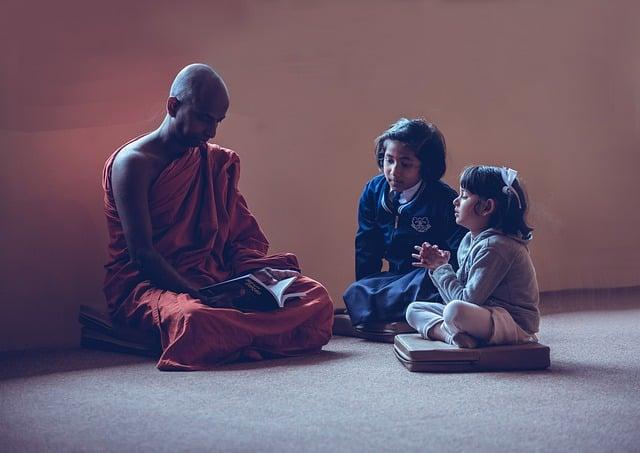In the bustling tapestry of modern life, where the cacophony of daily demands often drowns out the whispers of our inner world, finding solace and clarity can seem like an elusive dream. Yet, hidden within the folds of this frenetic existence lies an ancient practice, quietly beckoning those who seek refuge from emotional turbulence. Meditation, a timeless art of stillness and introspection, offers a sanctuary for the weary mind and a balm for the aching heart. This article delves into the transformative experiences of individuals who have turned to meditation as a means to navigate their emotional challenges. Through their journeys, we explore the profound impact of this practice in fostering resilience, cultivating inner peace, and unveiling the strength that lies within each of us to rise above the storms of our emotions.
Exploring the Depths of Mindfulness for Emotional Resilience
In the intricate dance of life, emotional challenges often take center stage, leaving us yearning for balance and clarity. Mindfulness, a practice rooted in ancient traditions, offers a pathway to navigate these turbulent waters with grace. By delving into meditation, individuals can unlock a treasure trove of tools that foster emotional resilience. The journey begins with the breath, a gentle yet powerful anchor that grounds us in the present moment. As we cultivate this awareness, we begin to notice the ebb and flow of our emotions, recognizing them as transient visitors rather than permanent residents.
- Body Scan: This meditation technique encourages a deeper connection with one’s physical sensations, promoting relaxation and reducing anxiety.
- Guided Visualization: Through imaginative journeys, practitioners can reframe negative emotions and cultivate a sense of peace and well-being.
- Loving-Kindness Meditation: By focusing on compassion and empathy, this practice helps to transform anger and resentment into understanding and forgiveness.
As we integrate these practices into our daily lives, we build an emotional toolkit that supports us in times of distress. Mindfulness becomes a steadfast companion, guiding us towards a more harmonious existence.

Harnessing Inner Peace: Meditation Techniques for Emotional Healing
In the journey towards emotional healing, meditation serves as a powerful ally, offering techniques that foster resilience and inner peace. Through the practice of mindfulness meditation, individuals learn to observe their thoughts without judgment, creating a space for emotions to be acknowledged and understood. This process encourages a gentle release of stress and anxiety, facilitating a more profound connection with one’s inner self. Loving-kindness meditation is another transformative approach, focusing on cultivating compassion and empathy, not only towards oneself but also extending to others. This practice gradually dissolves feelings of anger and resentment, replacing them with a sense of warmth and understanding.
For those seeking deeper introspection, guided visualization provides a safe haven to explore and transform emotional landscapes. By imagining serene settings and positive outcomes, practitioners can reframe negative emotions and experiences, fostering a sense of hope and renewal. The body scan technique is particularly effective in recognizing and releasing physical tension associated with emotional distress, promoting holistic healing. Incorporating these meditation practices into daily life can profoundly impact emotional well-being, offering a sanctuary of calm amidst the chaos of modern existence.
- Mindfulness meditation for observing thoughts
- Loving-kindness meditation to cultivate empathy
- Guided visualization for transforming emotions
- Body scan technique for releasing tension

Transformative Journeys: Personal Stories of Emotional Growth through Meditation
In the serene embrace of meditation, individuals often discover the profound power to navigate emotional turbulence and emerge with renewed strength. Through the stories of those who have embarked on this transformative journey, we find a tapestry of experiences that illuminate the path to emotional healing. Each narrative is a testament to the resilience of the human spirit, showcasing how meditation serves as a gentle guide through life’s challenges.
- Mindful Awareness: For many, meditation has cultivated a heightened sense of awareness, allowing them to recognize and process emotions without judgment. This practice has been pivotal in transforming emotional responses into opportunities for growth.
- Inner Peace: Amidst the chaos of modern life, meditation offers a sanctuary of calm. Practitioners often share how regular sessions have helped them cultivate an enduring sense of peace, even in the face of adversity.
- Empowerment: Through meditation, individuals have found the courage to confront and overcome deep-seated fears and anxieties. This newfound empowerment enables them to tackle life’s challenges with confidence and grace.
These stories remind us that while the journey through emotional challenges is deeply personal, the practice of meditation offers universal tools for healing and growth. Whether through the quiet reflection of a solitary practice or the shared energy of a group session, meditation continues to be a beacon of hope and transformation for many.
Practical Steps to Incorporate Meditation into Daily Life for Emotional Balance
Incorporating meditation into your daily routine can be a transformative journey towards achieving emotional balance. Start by setting aside a dedicated time each day, even if it’s just for a few minutes. Consistency is key, so aim to meditate at the same time every day, perhaps in the morning to set a peaceful tone or in the evening to unwind.
- Create a dedicated space: Choose a quiet spot in your home that feels peaceful and free of distractions. Enhance this space with calming elements like candles, cushions, or plants.
- Use guided meditations: If you’re new to meditation, guided sessions can be incredibly helpful. Apps and online platforms offer a wide range of meditations tailored for different emotional needs.
- Start small: Begin with short sessions of 5-10 minutes and gradually increase the duration as you become more comfortable with the practice.
- Mindful breathing: Focus on your breath to anchor your thoughts. Deep, slow breaths can help calm the mind and reduce stress.
- Reflect and journal: After meditating, take a moment to jot down any thoughts or feelings that arise. This can help you process emotions and track your progress over time.
By weaving these practices into your daily life, meditation can become a powerful tool for navigating emotional challenges with greater ease and clarity.
In Conclusion
As we journey through the labyrinth of our emotional landscapes, meditation stands as a steadfast companion, offering a gentle hand to guide us through the shadows and into the light. In the quiet embrace of mindful stillness, we find not only solace but also the profound strength to confront and transcend our emotional challenges. Each meditation experience is a unique tapestry, woven from threads of awareness, resilience, and transformation. As we close this exploration, let us carry forward the insights gained, nurturing the seeds of peace and understanding within. May your path be illuminated by the calm clarity of a mind at peace, and may you continue to explore the depths of your inner world with courage and compassion.
